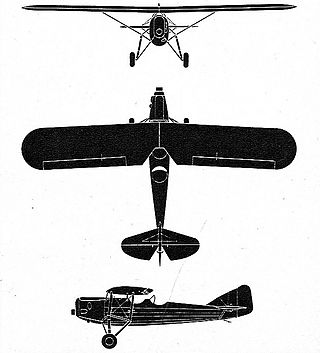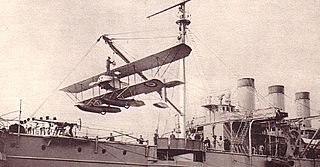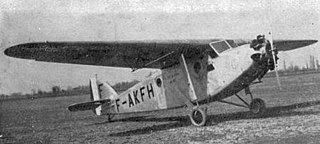
The Abraham Iris was a two-seat touring airplane produced in France in the early 1930s in two slightly different versions, the Iris I with a 75 kW (100 hp) Hispano-Suiza piston engine, and the Iris II with a Renault engine. The Iris was a conventional parasol wing monoplane with a neatly faired-in engine.

The Caudron C.60 was a French two-seat biplane of the 1920s and 1930s with a single engine and a canvas-covered fuselage. The French aircraft manufacturer Caudron developed this aircraft from the Caudron C.59. It was mainly used as a trainer aircraft.

The Nord Aviation 3202 is a 1950s French military trainer aircraft designed and built by Nord Aviation to meet a French Army requirement for a two-seat basic trainer, as a replacement for the biplane Stampe SV.4. Altogether, 101 examples were built, with the first flying on 17 April 1957.

The Blériot 127 was a monoplane bomber aircraft developed and produced by the French aircraft manufacturer Blériot.

The CAMS 37 was a French 1920s biplane flying boat designed for military reconnaissance, but which found use in a wide variety of roles.

The CAMS 55 was a reconnaissance flying boat built in France in the late 1920s which equipped the French Navy throughout the 1930s.

The Caudron C.109 was a light utility aircraft built in France in the late 1920s.

The Dewoitine D.19 was a fighter aircraft built in France in 1925 in response to a French Air Force solicitation.

The Levasseur PL.6 C.2, also known as Levasseur VI C.2, was a two-seat fighter aircraft built in France in 1926 in order to meet a 1925 C.2 Service Technique de l'Aéronautique (STAé) specification,. Constructed along the same lines as Levasseur's naval aircraft of the same era, it was a conventional, single-bay biplane with seating for the pilot and tail gunner in separate, open cockpits. Flight testing of the prototype commenced in 1926, and it was exhibited at the Salon de l'Aéronautique at the end of the year.

The Farman NC.470 was a French twin-engined floatplane designed as a crew trainer for the French Navy. It was used in small numbers for both its intended role as a trainer and as a coastal reconnaissance aircraft at the start of World War II.

The Caudron J Marine was an amphibious, two-seat, biplane equipped with floats and wheels, similar to the earlier Caudron J floatplane.

The SPCA 80 was a French transport monoplane designed by Société Provençale de Constructions Aéronautiques (SPCA) to meet a French government requirement for a single-engined colonial transport, specifically for police duties.

The Lioré et Olivier LeO H-180 was a 1920s French two-seat flying-boat built by Lioré et Olivier.

The SPCA 40T, also designated the SPCA VII, was a mailplane designed and produced by the French aircraft manfacturer Société Provençale de Constructions Aéronautiques (SPCA).

The SPCA 90 was a civil transport aircraft built in France in the early 1930s.

The Loire 250 was a French single-seat fighter monoplane designed and built by Loire Aviation of St. Nazaire.

The Potez-CAMS 160 was a one-off 5/13 scale flight model built in France, first flown in the summer of 1938 to test aerodynamic and hydrodynamic qualities of the Potez-CAMS 161 airliner and mail carrier, which was too large for detailed modelling in existing wind tunnels.

The SPCA 10 or SPCA Paulhan-Pillard E.5 was a large, all-metal, French reconnaissance and bomber flying boat flown in 1928. Only one was built, and it was lost in a fatal crash during development.
The Bleriot XL was a two-seat observation sesquiplane designed in France by Louis Bleriot during the early 1910s. Its structure was made of metallic materials.
The SPCA 60T was a French transport seaplane built in the early 1930s. The SPCA 60T had a high-wing monoplane configuration with engines in tandem and all-metal construction.

















